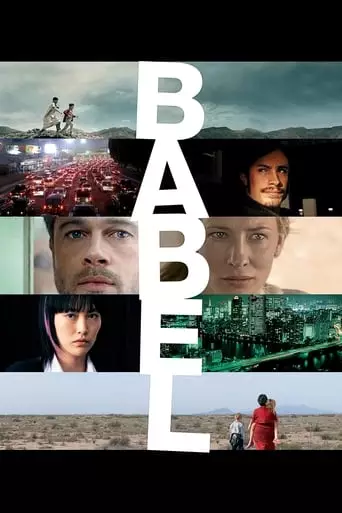
Babel (2006) Watch Online Free
In Babel, a tragic incident involving an American couple in Morocco sparks a chain of events for four families in different countries throughout the world.
Babel (2006), directed by Alejandro González Iñárritu, is a psychological drama that interweaves four distinct narratives across Morocco, Mexico, Japan, and the United States, exploring themes of communication, cultural barriers, and the far-reaching consequences of a single action.
Morocco
The film opens with a tragic incident in Morocco, where a rifle, purchased by a Japanese tourist, is accidentally discharged by two young Moroccan boys, leading to the injury of an American tourist, Susan Jones (Cate Blanchett). Her husband, Richard Jones (Brad Pitt), is a businessman traveling with her. The incident sets off a chain of events that affect multiple lives across different continents.
United States/Mexico
In the United States, Richard and Susan’s children, Debbie (Elle Fanning) and Mike (Nathan Gamble), are left in the care of their housekeeper, Amelia Hernández (Adriana Barraza). Facing a personal crisis, Amelia decides to take the children to her son’s wedding in Mexico. During their return trip, they are detained at the U.S.-Mexico border, leading to a series of misunderstandings and escalating tensions.
Japan
In Japan, Chieko Wataya (Rinko Kikuchi), a deaf-mute teenager, struggles with the recent death of her mother and her father’s (Kōji Yakusho) emotional distance. Her journey explores themes of isolation and the search for connection, culminating in a poignant encounter that offers a glimpse of hope.
Interconnectedness
The film masterfully intertwines these narratives, demonstrating how a single event—a rifle shot in Morocco—catalyzes a series of interconnected incidents across the globe. This structure highlights the fragility of human connections and the profound impact of seemingly isolated actions.
Babel delves into several profound themes:
Upon its release, Babel received critical acclaim for its ambitious storytelling and direction. It won the Best Director Award at the 2006 Cannes Film Festival and was nominated for seven Academy Awards, including Best Picture and Best Director. The film’s intricate narrative and exploration of global interconnectedness resonated with audiences and critics alike, solidifying its status as a significant work in contemporary cinema.
After viewing Babel, you may experience a range of emotions:
In summary, Babel is a compelling film that intricately weaves together multiple narratives to explore profound themes of communication, isolation, and the far-reaching consequences of human actions. Its critical acclaim and emotional depth make it a significant work in contemporary cinema.
